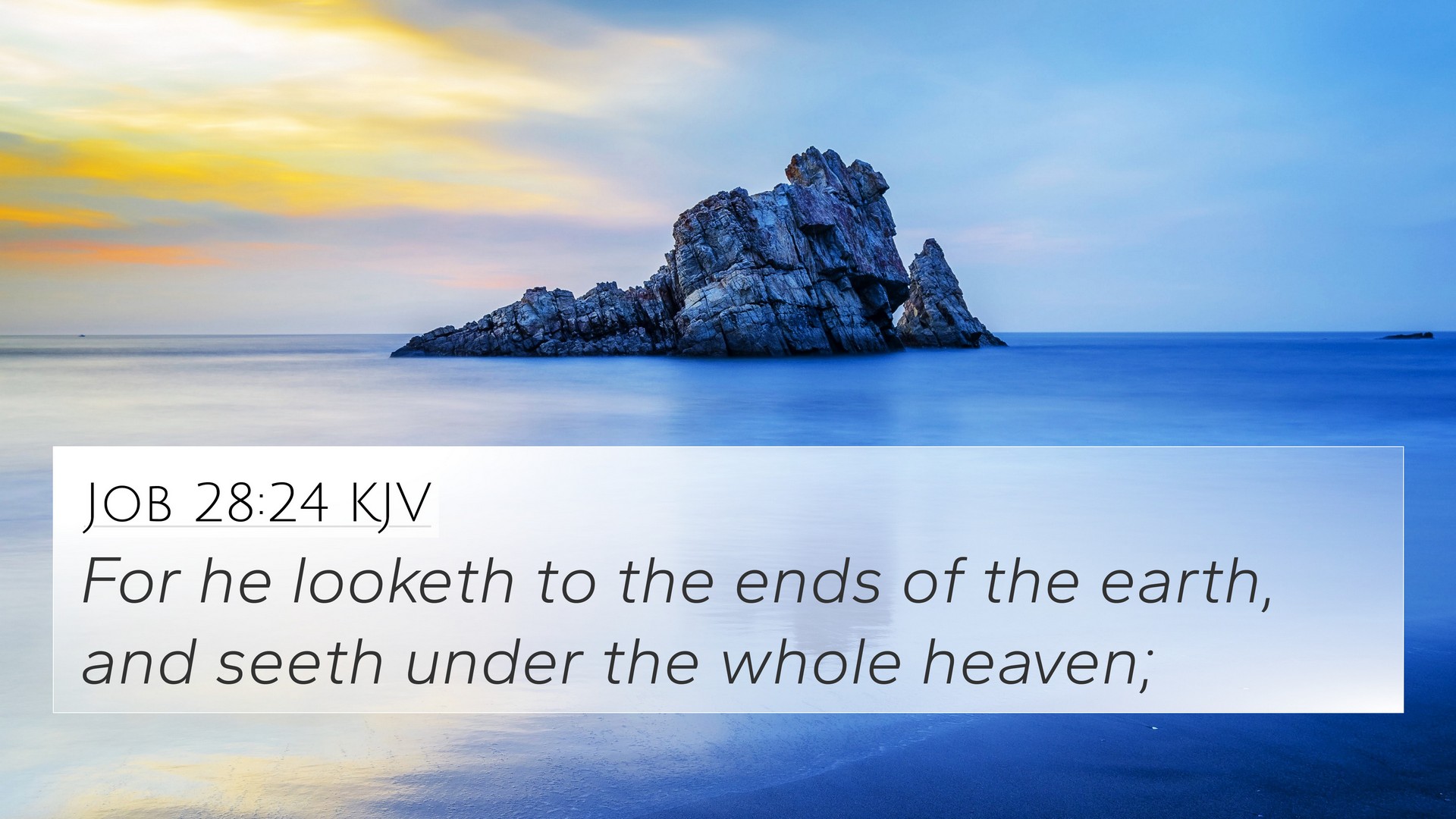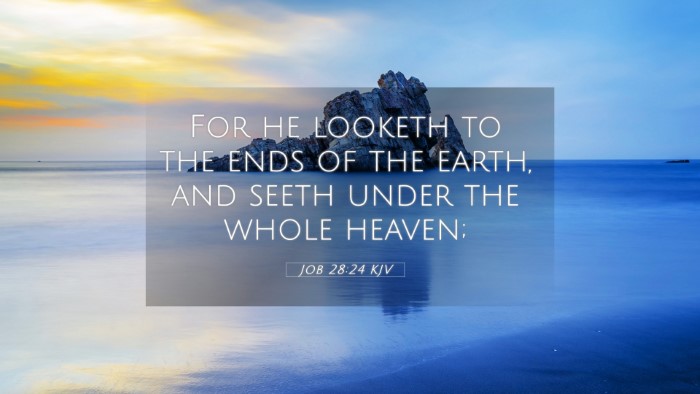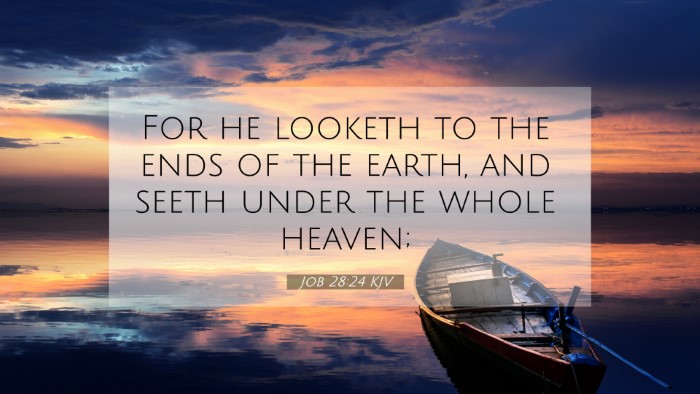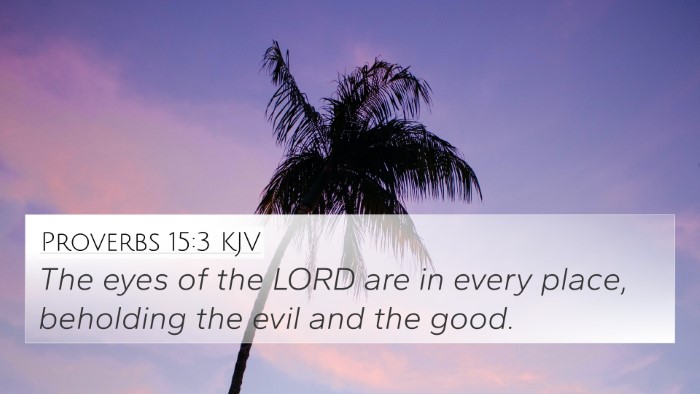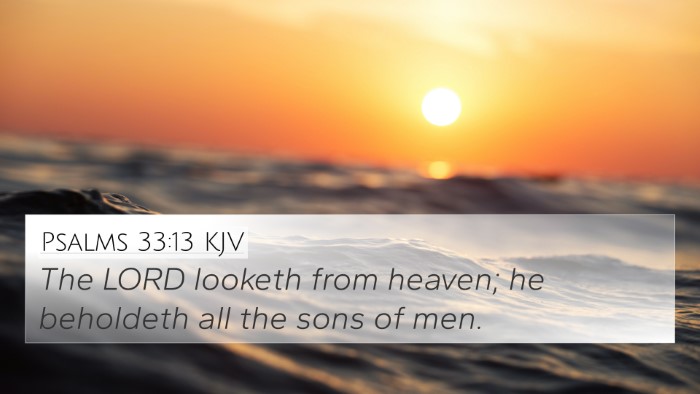Old Testament
Genesis Exodus Leviticus Numbers Deuteronomy Joshua Judges Ruth 1 Samuel 2 Samuel 1 Kings 2 Kings 1 Chronicles 2 Chronicles Ezra Nehemiah Esther Job Psalms Proverbs Ecclesiastes Song of Solomon Isaiah Jeremiah Lamentations Ezekiel Daniel Hosea Joel Amos Obadiah Jonah Micah Nahum Habakkuk Zephaniah Haggai Zechariah MalachiJob 28:24 Similar Verses
Job 28:24 Cross References
For he looketh to the ends of the earth, and seeth under the whole heaven;
Uncover the Rich Themes and Topics of This Bible Verse
Listed below are the Bible themes associated with Job 28:24. We invite you to explore each theme to gain deeper insights into the Scriptures.
Job 28:24 Cross Reference Verses
This section features a detailed cross-reference designed to enrich your understanding of the Scriptures. Below, you will find carefully selected verses that echo the themes and teachings related to Job 28:24 KJV. Click on any image to explore detailed analyses of related Bible verses and uncover deeper theological insights.
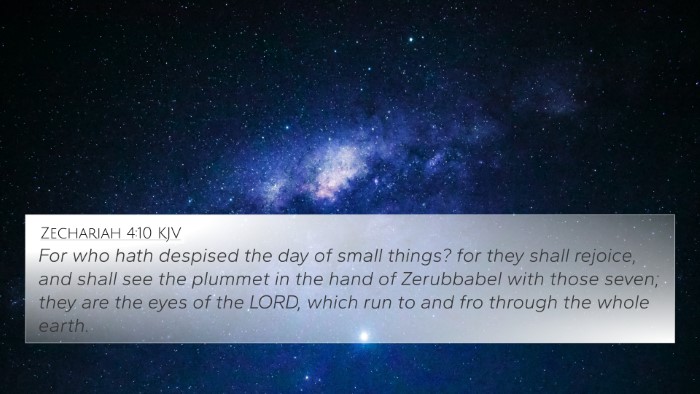
Zechariah 4:10 (KJV) »
For who hath despised the day of small things? for they shall rejoice, and shall see the plummet in the hand of Zerubbabel with those seven; they are the eyes of the LORD, which run to and fro through the whole earth.
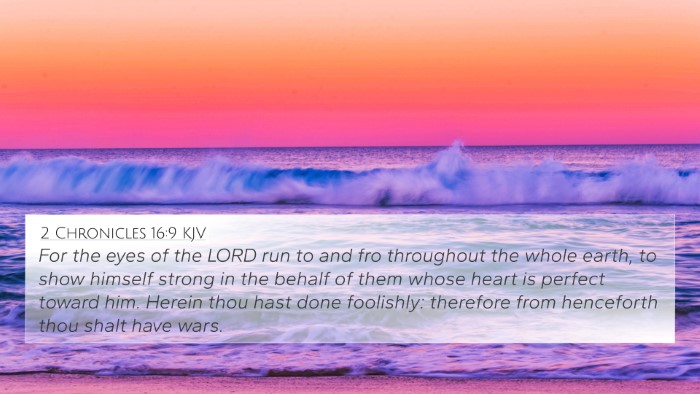
2 Chronicles 16:9 (KJV) »
For the eyes of the LORD run to and fro throughout the whole earth, to show himself strong in the behalf of them whose heart is perfect toward him. Herein thou hast done foolishly: therefore from henceforth thou shalt have wars.
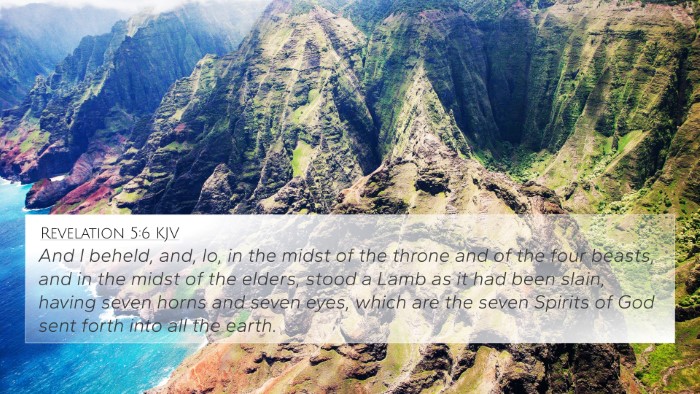
Revelation 5:6 (KJV) »
And I beheld, and, lo, in the midst of the throne and of the four beasts, and in the midst of the elders, stood a Lamb as it had been slain, having seven horns and seven eyes, which are the seven Spirits of God sent forth into all the earth.
Job 28:24 Verse Analysis and Similar Verses
Understanding Job 28:24
Verse: Job 28:24 - "For he looketh to the ends of the earth, and seeth under the whole heaven."
This verse from the book of Job encapsulates profound themes about God's omniscience and the intricate relationship between divine knowledge and human understanding. The context of the verse within the broader narrative highlights the pursuit of wisdom and the limitations of human knowledge in contrast to God's infinite understanding.
Verse Analysis and Interpretation
Job 28:24 serves as a pivotal point in Job's discourse on wisdom. Here’s a synthesized interpretation from various public domain commentaries:
-
Matthew Henry:
Henry emphasizes the all-encompassing nature of God's sight. He notes that while humans search for wisdom, they often overlook the omnipresence of God, who sees all things, both in heaven and on earth. This serves as a reminder of the limitations of human perspective.
-
Albert Barnes:
Barnes highlights that this verse illustrates God's sovereignty and His ability to see beyond the physical world. He argues that God's knowledge allows Him to comprehend the entire universe, offering insight into the nature of divine wisdom as infinitely superior to human understanding.
-
Adam Clarke:
Clarke connects this verse's meaning to the overall theme of Job, where clarity, insight, and understanding are paramount. He points out that God’s wisdom is not bound by space or time, contrasting human limitations with divine omniscience.
Thematic Connections
Job 28:24 presents several key spiritual themes:
- Omniscience of God: The verse underscores the concept that God's knowledge is complete and all-encompassing. This theme resonates throughout scripture, asserting God's understanding of all matters.
- Human Limitations: It highlights the limitations of human wisdom and comprehension, suggesting that meaningful understanding can only come through divine revelation.
- The Pursuit of Wisdom: The surrounding passages discuss the quest for wisdom, which is a key topic throughout the Bible, seen in Proverbs and Ecclesiastes.
Bible Verse Cross-References
To deepen your understanding of Job 28:24, consider these related scriptures:
- Psalms 139:7-10: These verses speak of God’s omnipresence and His ability to see us wherever we are.
- Proverbs 2:6: This passage discusses how God’s wisdom is a gift, emphasizing that it comes from Him.
- Isaiah 40:28: It reinforces the theme of God's everlasting strength and understanding.
- 1 Samuel 16:7: Here, God distinguishes between human perception and divine insight when choosing a king.
- Hebrews 4:13: This New Testament verse reiterates that nothing in creation is hidden from God’s view.
- Job 12:22: Job acknowledges God's ability to unveil darkness and comprehend all hidden things.
- Proverbs 8:22-31: This passage personifies wisdom and emphasizes God's eternal role in creation and understanding.
Conclusion
Job 28:24 serves as a profound reminder of the limits of human wisdom in comparison to divine understanding. Reflecting on this verse and its connections encourages deeper insights into the nature of God and the search for true wisdom. The cross-references provided illustrate the interconnectedness of biblical teachings and demonstrate how themes of divine omniscience and human limitation recur throughout scripture.
